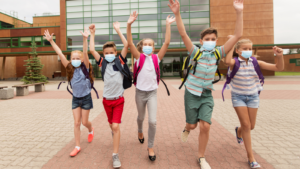
In Fall 2021, The ABC Science Collaborative launched the “Test-to-Stay in School: COVID-19 Testing Following Exposure in K-12 School Communities” research study in partnership with the N.C. Department of Health and Human Services.
The goal of the program, which was conducted through the Duke Clinical Research Institute, was to address the consequences of missed school days due to quarantine. In 2021, schools returned to in-person instruction, but quarantine requirements for students and staff continued to inhibit learning. The “Test-to-Stay” study used COVID-19 testing as an alternative to quarantine of close contacts who were exposed to SARS-CoV-2, the virus that causes COVID-19.
How It Worked
Following consent, individuals who had an exposure to SARS-CoV-2 and were asymptomatic received up to four COVID-19 rapid tests, administered over several days following the exposure. The individual was also monitored for COVID-19 symptoms and agreed to wear a mask while enrolled in the study. If the individual remained asymptomatic, agreed to wear a mask, and continued to test negative, they were allowed to remain in school following the exposure.
Participation in this program was completely voluntary. Student and staff participation required consent or consent/assent. Individuals who did not wish to participate in the testing program had to quarantine according to local health department policy.
The ABCs of Keeping School Communities Healthy
The ABC Science Collaborative team developed a COVID-19 Testing Tool to help school leaders select the SARS-CoV-2 testing strategies to help them keep their students and staff healthy.
Learn more
View the COVID-19 testing project reports and summaries.